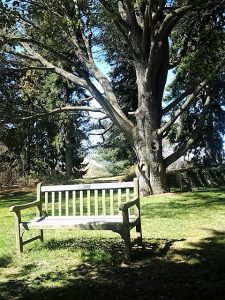 Psalm 25:1-3
Psalm 25:1-3
In a culture of fantasy, the people of God need to demonstrate the reality that people who do not know the Lord sadly lack. As the Holy Spirit tells us in the word of God, all people seek for happiness (Ecclesiastes). But our culture has passed that. In our culture, people pursue pleasure, do all possible to avoid pain and self-denial, and want immediate gratification. Generally speaking, people pursue anything that promises change by a single event or a very simplified process.
We need to think and act differently, to face life in the world that the Lord has ordered that we live in, and to live in the way that demonstrates God’s surpassing glory. One way we can start doing this is to admit, “Hello, my name is ________, and I’m a struggler. I struggle with life’s fears, troubles and uncertainties; I struggle with the many times I rebel against God; and yes, I even struggle with knowing God. But I also know that I don’t struggle alone. God is with me, and so are his people. Let me tell you about what God is doing in the struggles of my life.”
This psalm has evidence of being carefully put together in the form of an acrostic poem. So then, it is not a spontaneous composition, but the result of hard work and meditation. It has the structure of a “meditation sandwich”. The “bread” of the sandwich consists of three prayers. The first two are in verses 1-7, and the third is in verses 16-22. The “meat” of the sandwich is the meditation on God and his friendship with his people. Let us consider the first two prayers together.
David struggled with his hope in God. In you, Lord my God, I put my trust. I trust in you; do not let me be put to shame, nor let my enemies triumph over me. No one who hopes in you will ever be put to shame, but shame will come on those who are treacherous without cause.
(25:1-3 NIV). Clearly, he experienced the tension between confidence and disgrace that is part of hope in this world. Too often we idealize spiritual qualities like hope and faith, picturing either one as possessed only by the triumphant. But David, who saw many mercies of God for his benefit, struggled in this area. However, he did not wallow in self-pity. He reached out to the living God.
Next time in this psalm, we will listen to how David addressed the Lord. Now, we will concentrate on the fact that he did pray to the Lord. We ought to have God at the top of the list when we are in struggles. Brothers and sisters in Christ, family, friends, and counselors can play valuable roles in our lives. However, we ought first to turn to the Lord. I think most of us realize God’s priority in the life of faith. Yet, this can be a serious challenge. We can see people and find it more natural to seek them. It is also far too easy to use the forms of prayer, while avoiding direct, meaningful conversation with God our Father. We must concentrate on the great God to whom we pray. He has all-power and can make changes in us and our circumstances. Many times, (not every time), the change must first occur in us, before the Father will change other matters. If a child likes to scribble on the walls with crayons, it is wise to train the child not to do that before you repaint the walls. So then, we must approach the Father with a willingness for him to change us. “Lord, I’m struggling in this situation, but I need to refocus on you and stop obsessing about my problem. Give me grace to ‘drop the crayon’ because I’m doing a lot of ‘scribbling’.”
The ‘scribbling’ can take many forms, including the failure to interact with God in a personal manner. He is not a ‘vending machine’ and prayers are not ‘dollar bills and quarters’ to get power from him. David had the right approach. Listen to his opening words: In you, Lord my God…. Let us talk with the Lord as the Holy and Exalted Person that God is.
Grace and peace, David
